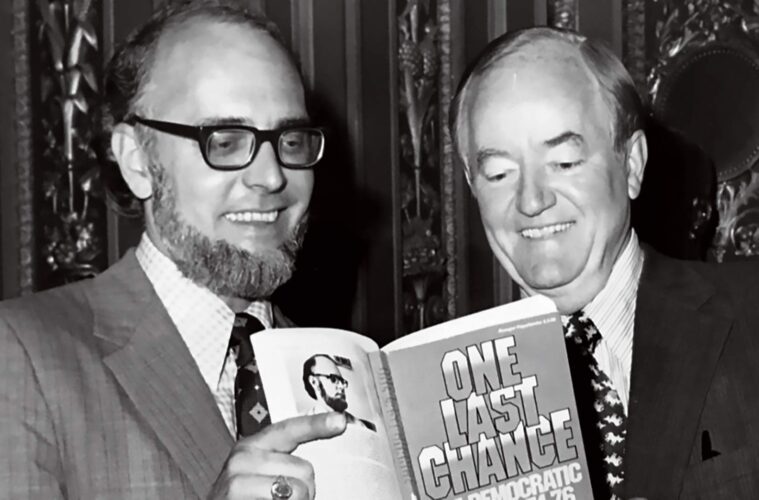It was 2:30 a.m. on June 18, 1972, when the resounding ring of the telephone woke Nancy and John Stewart ’57.
“When you get a call like that in the middle of the night, your first thought is something terrible has happened,” John told WBIR in 2017. “Something terrible did happen, but we didn’t realize how serious it was at the time.”
John’s secretary was on the line, relaying information from the Washington, D.C., Metropolitan Police: Five burglars were found in John’s office at Watergate. As the communications director for the Democratic National Committee, John was one of the first to be notified of the break- in that led to one of the biggest political scandals in U.S. history. But being a witness to history isn’t the only accomplishment for which John, who died on Sept. 29, 2021, at age 86, will be remembered.
As a top aide for Sen. Hubert Humphrey (pictured above [right], who later became vice president under Lyndon B. Johnson), John helped organize the passage of the Civil Rights Act of 1964, “one of the most significant legislative achievements in American history,” according to senate.gov. Additionally, John often spoke to the press about the bill, and he took appointments with the public for Humphrey. Once, an impassioned woman came into his office rallying for a section on the chopping block — about discrimination based on sex — to be left in the document. Afterward, John gave Humphrey some sage advice: “Senator, do not have any thoughts about removing Judge Smith’s sex amendment from the bill. If you do, you will encounter an enraged Betty Friedan. Believe me, senator, you do not want that to happen. Trust me on this one.”
He assisted Humphrey for several more years, and then in 1980, moved to Knoxville, Tenn., where he’d stay until the end of his life. In addition to working for the Tennessee Valley Authority, the largest public utility in the country, John was an active part of the Knoxville community.
In retirement, he continued his work for social good, creating a medical care fund for disaster relief workers following a coal ash spill at a nearby fossil plant. He also served as a consultant for NASA and helped found the Georgian Institute of Public Administration following the fall of the Soviet Union.
Through it all, John was a loyal Colgate son — in many TV interviews about the Watergate scandal, he was seen wearing his quintessential maroon cap, showing the world his pride in alma mater. As a student, he was editor of the Maroon and involved in Maroon Key, the Take Two Film Committee, Konosioni, student government, and indoor track. He was a member of the Alpha Tau Omega fraternity. After Colgate, John used his political science degree (later earning his PhD) to create change in an evolving country. A fervent class editor, he kept the men of 1957 up to date on all the latest happenings with dedication and care. “He was a lively guy, with many, many interests,” Nancy told the News Sentinel.
John is survived by Nancy, the woman at his side as he received the call that would change his life as well as life’s other obstacles and joys. She, along with son Mike and daughter Cara, were also at his side as he passed away.
Further reading: John Stewart chronicled his life in politics in One Last Chance: The Democratic Party, 1974–76 (Praeger Publishers, 1974); Witness to the Promised Land (Seven Locks Press, 2005); and When Democracy Worked: Reflections on the Passage of the Civil Rights Act of 1964 (New York Law School Law Review, 2015).

